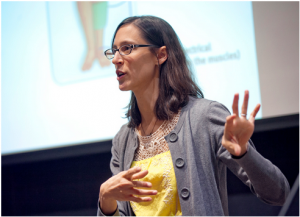 Below you will find course descriptions for classes that I regularly teach. I have also mentored students through Independent Study (PSYC 391-392) projects, Advanced Research (PSYC 491-492), Honors Theses (PSYC 495-496), and Lafayette’s EXCEL Scholars Program. Some of these students have received Student Research Grants from Lafayette to support their work and/or have presented their findings at Lafayette’s Student Research Poster Session, the annual Lehigh Valley Association of Independent Colleges (LVAIC) Undergraduate Psychology and Neuroscience Conference, the annual National Conference on Undergraduate Research, or professional conferences such as the annual meetings of the Association for Behavioral and Cognitive Therapies (ABCT) or Eastern Psychological Association (EPA). I am proud to have been nominated for multiple teaching and advising awards at Lafayette and to have received funding for my pedagogy in the form of a Teaching with Technology grant. I regularly participate in workshops, seminars, and conferences to keep my teaching skills sharp, such as the annual Psychology One Conference and the Intro Psych Coast-to-Coast virtual gathering.
Below you will find course descriptions for classes that I regularly teach. I have also mentored students through Independent Study (PSYC 391-392) projects, Advanced Research (PSYC 491-492), Honors Theses (PSYC 495-496), and Lafayette’s EXCEL Scholars Program. Some of these students have received Student Research Grants from Lafayette to support their work and/or have presented their findings at Lafayette’s Student Research Poster Session, the annual Lehigh Valley Association of Independent Colleges (LVAIC) Undergraduate Psychology and Neuroscience Conference, the annual National Conference on Undergraduate Research, or professional conferences such as the annual meetings of the Association for Behavioral and Cognitive Therapies (ABCT) or Eastern Psychological Association (EPA). I am proud to have been nominated for multiple teaching and advising awards at Lafayette and to have received funding for my pedagogy in the form of a Teaching with Technology grant. I regularly participate in workshops, seminars, and conferences to keep my teaching skills sharp, such as the annual Psychology One Conference and the Intro Psych Coast-to-Coast virtual gathering.
First-Year Seminar: Psychology and the Media (FYS 122)
Media have powerful effects on our beliefs, attitudes, and behaviors. In turn, psychology can help us understand how we consume and relate to the media. This seminar introduces students to the wide variety of ways in which media and psychology interact, while meeting the central goal of the First-Year Seminar Program: “to introduce students to intellectual inquiry through engaging them as thinkers, speakers, and writers.” Selected topics include advertising and persuasion, mobile health, news coverage of psychology-related stories, media depictions of violence, love and attraction, and how psychopathology is (mis)portrayed in the media. The central purpose of this course is to encourage students to become “media literate,” particularly with respect to psychological principles, topics, and issues. Click here for a profile of this course and a detailed description of Lafayette’s First-Year Seminar Program, posted on Lafayette’s website in December 2018.
Lafayette Initiative for Malagasy Education (LIME) (INDS 171)
This course requires a 1.5-year commitment from students, including a 3-week winter interim trip to Antananarivo, Madagascar. The course has two objectives. First, students learn about the education system of a developing country and explore the role of education in development, broadly defined. Students quickly encounter the constraints that a country like Madagascar faces, especially in terms of improving post-basic educational outcomes. Understanding these factors prepares students for the second objective, which is to participate in a peer-to-peer mentoring program with promising young high school students from Madagascar. The idea is to prepare the Malagasy students for the process of applying to colleges in the United States. As products of a different educational system, bright Malagasy students are at a disadvantage when they apply to high-quality post-secondary institutions in the United States (e.g., Lafayette College). Students work with Malagasy students from Lycée Andohalo, a public high school in Antananarivo, over a 1.5-year period, including in person during a December to January winter interim trip to Madagascar. To learn more about this amazing program, visit the LIME website!
Introduction to Psychological Science (PSYC 110)
The goal of this course is to provide a broad survey of the field of psychology, by introducing students to key theories, questions, methodologies, and empirical findings in the field. The course covers the scientific study of human behavior across many levels (ranging from neurochemical to societal). Specific topics include basic research methods in social science; the biological and physiological underpinnings of sensation, thought, and behavior; basic psychological principles that underlie learning, motivation, thought, behavior, and our social interactions; development across the lifespan; and the psychological disorders and treatment of mental health problems. Secondary goals of this course include learning about the ways in which psychological principles are at work in our day-to-day lives and becoming an educated and critical consumer of scientific media.
Psychological Diagnoses (PSYC 232)
This course provides students with a general introduction to the study of psychopathology. We review the etiology, symptomatology, and empirically-supported treatment of major psychological disorders and outline diagnostic frameworks and theoretical perspectives in the field. We also cover the empirical bases of current knowledge of psychopathology and its treatment and discuss current ethical issues, controversies, and developments in the field. In addition to a standard text, case studies, memoirs, and written assignments are used to understand the causes, symptoms, and treatment of abnormal behavior. The influence of societal values, culture, and historical context in defining psychopathology and its treatment are discussed throughout the course.
Psychological Treatments (PSYC 237)
This course introduces students to the science and practice of psychotherapy, by covering the historical development, theoretical rationale, characteristics, and empirical bases for current models and methods of evidence-based psychological treatments with adult populations. Some of the major schools of psychotherapy that we examine include psychodynamic therapies, the humanistic orientation, systems-based approaches, behavior therapy, cognitive therapy, and “third-wave” and emerging approaches (e.g., mindfulness-based cognitive therapy, acceptance and commitment therapy, unified protocol). Attention is also paid to integrative and eclectic approaches. A strong emphasis is placed on behavioral, cognitive, and third-wave treatments. Students are involved with both conceptual and practical aspects of each approach, by applying different theories of psychotherapy to the clinical setting through readings, discussions, videos, and experiential exercises.
Clinical Psychology with Lab (PSYC 329 & PSYC 329L)
This course provides an advanced study of how clinical psychologists ethically and effectively assess, research, and treat psychological diagnoses. This is a laboratory course, in which students learn about the kinds of questions and analyze the kinds of data that clinical scientists and practitioners do. Specific topics include the process of psychosocial treatment development, cultural competence in clinical science, common research strategies and data analytic techniques (e.g., qualitative research, single-case design, pilot studies, randomized controlled trials, ecological momentary assessment and intervention), ethical considerations, and future trends in clinical psychology research. The objectives of this course are to familiarize students with common clinical psychology research methods, to foster understanding of how research informs knowledge about psychological diagnoses and treatments, and to provide students hands-on exposure to selected research techniques, against a backdrop of ethical, culturally-competent practice.
Mood Disorders (PSYC 334)
This course provides students with an in-depth, detailed understanding of the symptomatology, etiology, and treatment of unipolar depression and bipolar disorders. The class takes a biopsychosocial approach to understanding how mood disorders develop and how they are effectively treated. We focus our overview on current topics of interest in the field, by discussing recent studies highlighting novel, cutting-edge research and treatment paradigms. Key topics such as comorbidity, diversity and cultural considerations, and suicide are explored. Attention is also devoted to current controversies in the field (e.g., What is behind the apparent recent epidemic of pediatric bipolar disorder? Does long-term maintenance treatment with psychotropic medication result in worse overall outcomes? Can suicide be contagious?)
Practicum in Psychology (PSYC 342-343)
Practicum in Psychology is an experience-based, service-learning course. Students volunteer in a self-selected field setting (i.e., an internship) that matches their individual interests. Coursework and individualized instruction emphasize development of professional vocational skills and the constructive resolution of commonly encountered professional problems. Specific learning objectives include: completing a semester-long internship in a work environment of students’ choosing; identifying the major areas of research and practice in applied psychology; understanding the fundamental goals, methods, and challenges of conducting empirical research to address practical problems in psychology; understanding the fundamental methods and challenges of applying evidence from psychological research discussed in coursework toward professional practices; developing self-directed work and academic skills; and developing skills and strategies for effectively addressing common challenges encountered in professional workplaces.
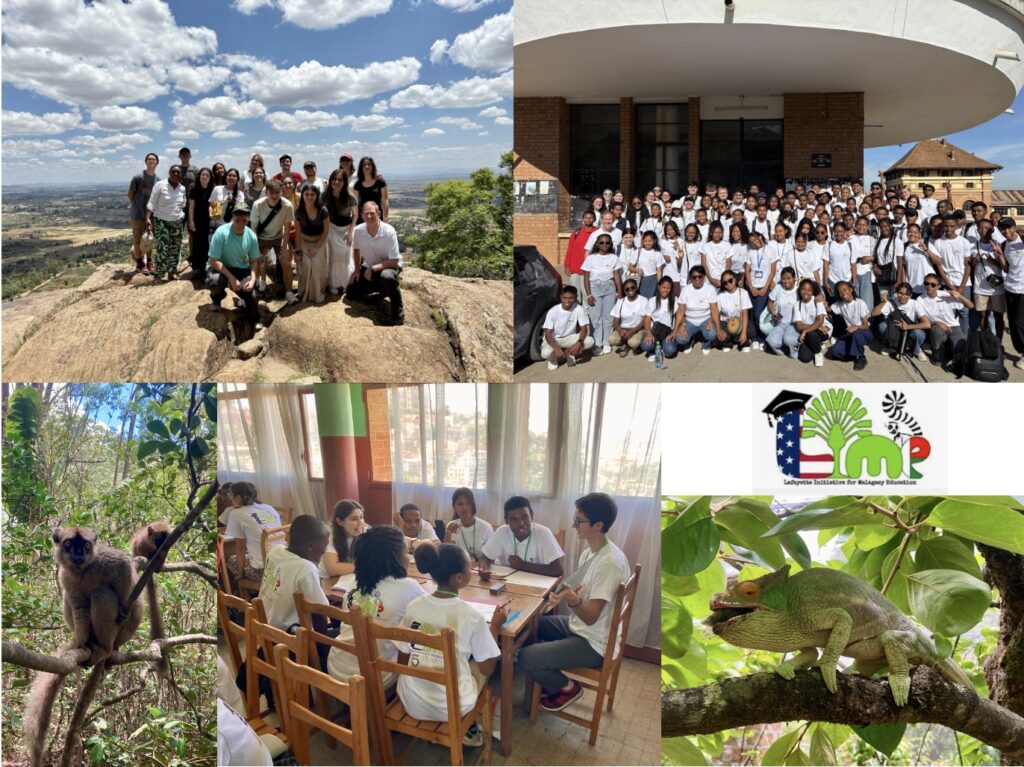
LIME mentors, students, and faculty advisors (and some wildlife!) in Madagascar in January, 2025
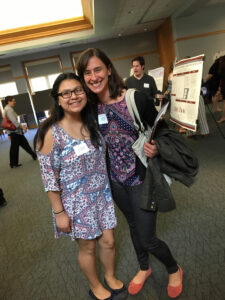
With student Leslie Villaverde (’18) at the 2018 LVAIC Undergraduate Psychology Research Conference
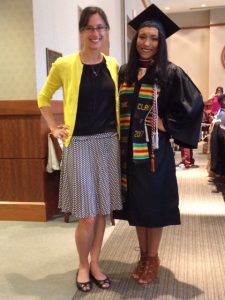
Me with Natalie Cardenas – who was my student, then my RA, & eventually my Excel Scholar – at the 2017 Posse Scholar graduation
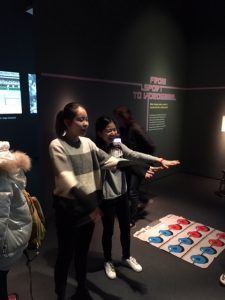
Psychology & the Media students Rannie Peng (’22) & Mouy An (’22) test out some interactive video games at the Museum of the Moving Image in Queens, NY
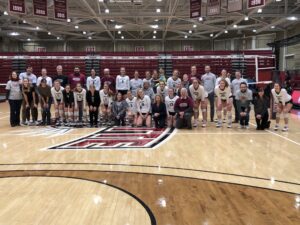
Volleyball Faculty/Staff Appreciation Night, November, 2019
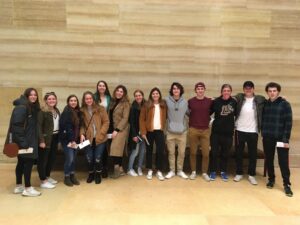
My Fall 2019 FYS 122 class at the Philadelphia Museum of Art
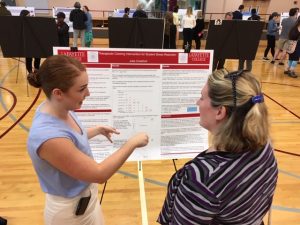
My honors student Julia Crawford (’19) presents her thesis work on a therapeutic coloring intervention at the 2019 Lafayette Student Research Poster Session
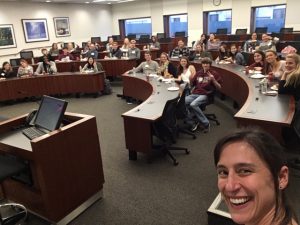
Me with two sections of my FYS class on a 2018 field trip to New York City